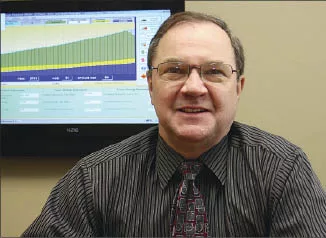
Home » Advisers plan varied routes to navigate choppy market
Advisers plan varied routes to navigate choppy market
While world events affect markets, consultants differ on response

December 2, 2010
With recent news about European debt woes, a currency cold war between the U.S. and China, and bad loans piling up in India, uncertainties have sent worldwide securities markets on a roller-coaster track. In a reflection of that turbulence, advice from financial consultants here ranges from hold a steady course to be prepared to swerve.
Kelly C. Ruggles, a fee-based financial planner and president of American Reliance Group Inc., of Spokane, says market volatility is the new norm.
"The news is full of how interconnected the world is economically, as evidenced through President Obama's recent G-20 trip," he says. "If China's or India's economies hit the skids, this absolutely will affect us."
Greer Gibson Bacon, financial planner and principal at Asset Planning & Management Inc., of Spokane, says she tells her clients to stick with their financial plans for the long haul.
"The market does have day-to-day gyrations based on emotional reactions to an event, not on the longer-term fundamentals of a particular industry or company," she says.
Matt Lusk, a senior financial consultant in the Spokane office of Great Falls, Mont.-based D.A. Davidson & Co., says clients hire his firm in part to avoid letting fear dictate the better part of their decision-making process.
Even in the recent choppy markets, clients in general have developed thicker skins than in 2008 and 2009, when they were mostly scared about whether they would have the money they would need when they retired, Lusk says.
"If they're still invested in the market today, they've had to live through a rough market to get there," he says.
Ruggles says a combination of two different investment strategies can reduce exposure to volatility.
One strategy is to have investments in conservative portfolios designed not to lose money and to beat inflation, he says. The other is to seek to build target-return portfolios and to be willing to move quickly as the market dictates.
"This will reduce volatility and the chance for losses," he says. "You don't have to get 8 percent return, and it's not worth the risk."
Ruggles says most of his new clients are within five years of retiring. Some clients are questioning whether diversification in investments is the best strategy to spread risk while promoting growth. Diversification historically was the key to building an investment with a target return, he says.
"This worked fine until 2008, when this strategy failed us, as every exchange in the world went down," he says.
Now, financial planners need to be prepared to react quickly to mitigate losses, Ruggles says.
"We can no longer be passive in big market downturns," he says.
Bacon says clients were more worried when the market was at its lowest than they have been more recently because the market, even amid daily uncertainties, has been trending slowly upward.
"The human reaction is when the market is down and it's an absolutely wonderful opportunity to buy, it feels very scary," she says.
"Conversely when the market hits new highs and it's time to take profits, people are so enthusiastic they want to put all of their money into whatever hot investment there happens to be," she adds.
A financial planner's job, though, is not to be ruled by emotions, says Bacon, who operates a fee-only financial planning firm, meaning it's compensated by client fees, rather than commissions on transactions or third-party compensation.
"My last couple of years have been very good," she says. Many of her clients seek her services for retirement planning.
Bacon says she's not hearing fearful comments from her longtime clients, but some of her newer clients who are near retirement age have come to the firm for a second opinion.
"That's some reflection of the types of securities I advise them to invest in, such as high-quality, large-cap stocks with secure earnings and growing dividends," she says. "My basic philosophy hasn't changed. That's been my primary investment model for 30 years."
Bacon attributes much of recent market fluctuation to headline risk, in which an event or news story can affect markets, that's being fanned by computerized trading.
Still, there's little reason to be concerned over market fluctuations of 100 or 200 points, Bacon says.
"When put into perspective, a market swing of 100 points is less than 1 percent" of the prevailing level of the Dow Jones industrial average, she says.
Lusk says clients have become accustomed to volatility in the marketplace, and they aren't panicking.
He adds he hasn't fielded a single call from a client concerning recent developments abroad.
"This is one of those blips that we've got to make it through," he says.
Lusk says clients are recovering from the losses of 2008. "My clients are whole from where we started this mess," he says.
The people who've been punished for letting emotions drive their decisions are the ones who jumped out of the market, he says.
Latest News
Related Articles


_web.webp?t=1769673727)
_web.webp?t=1769673728)
_web.webp?t=1769673735)
